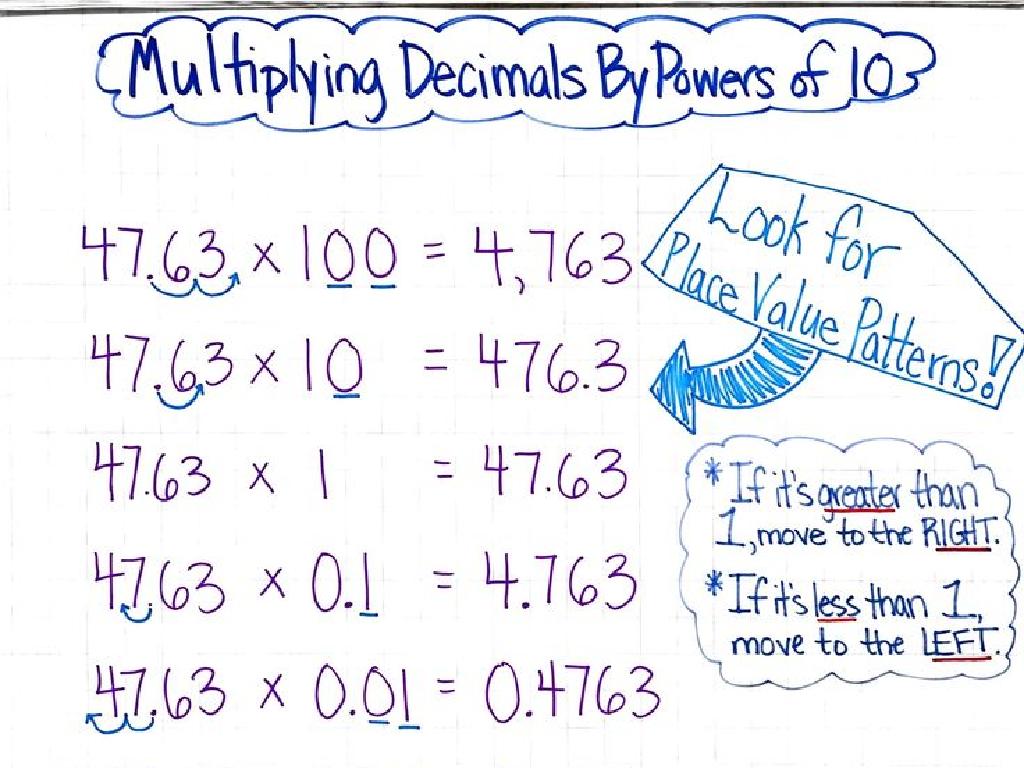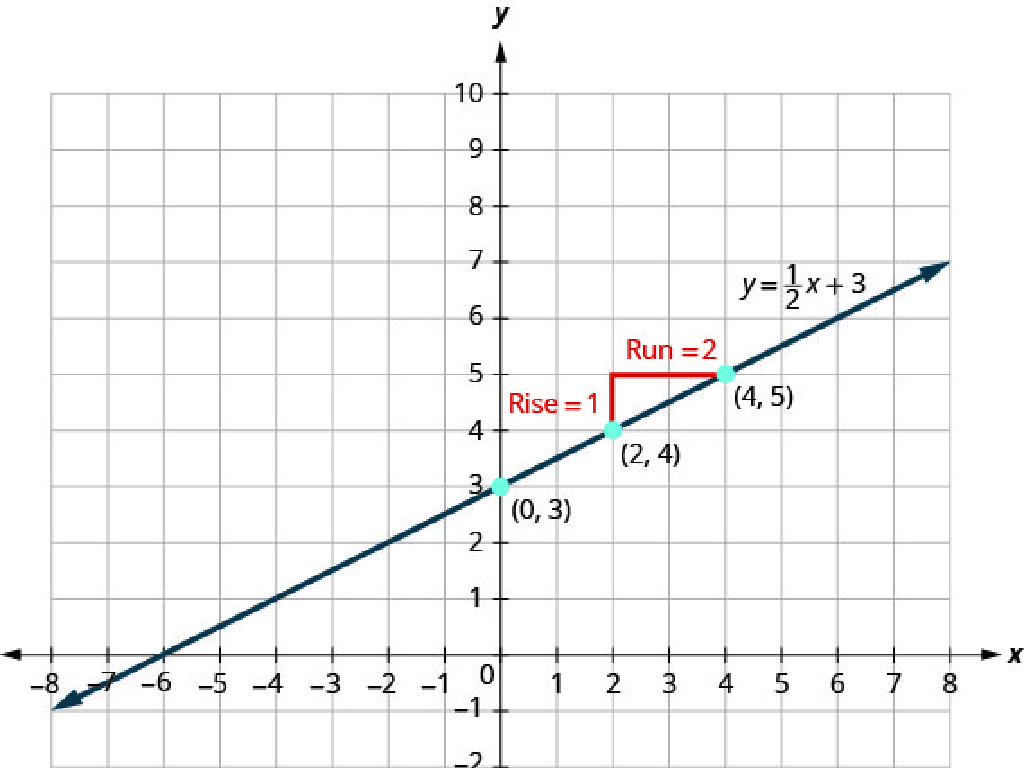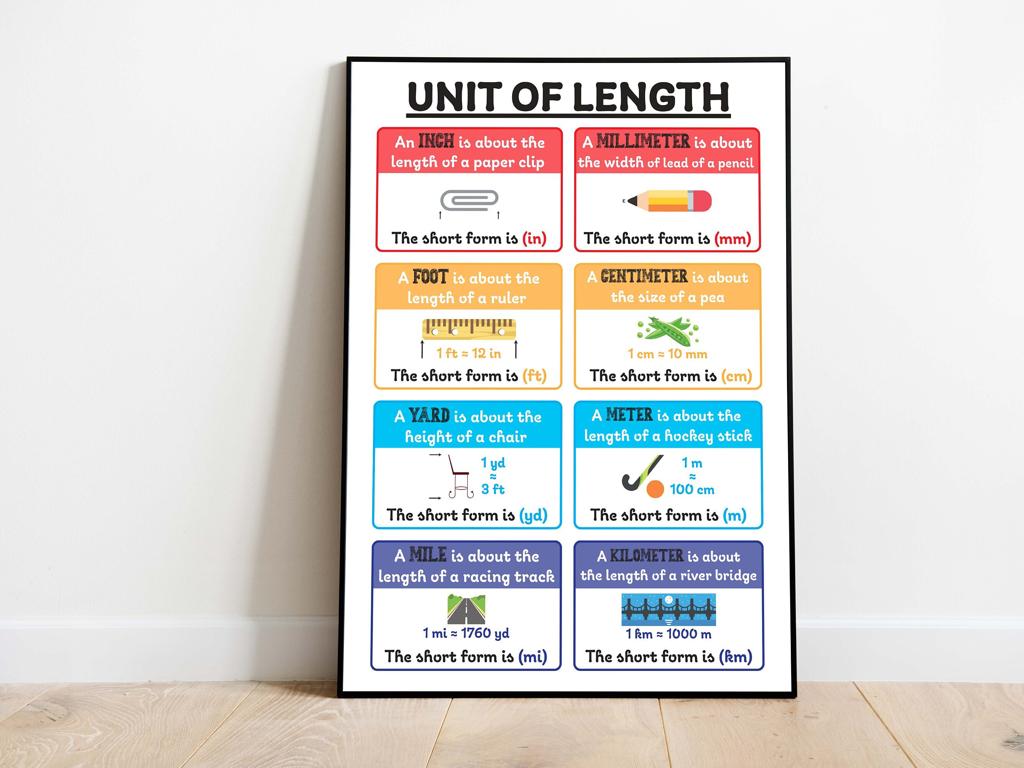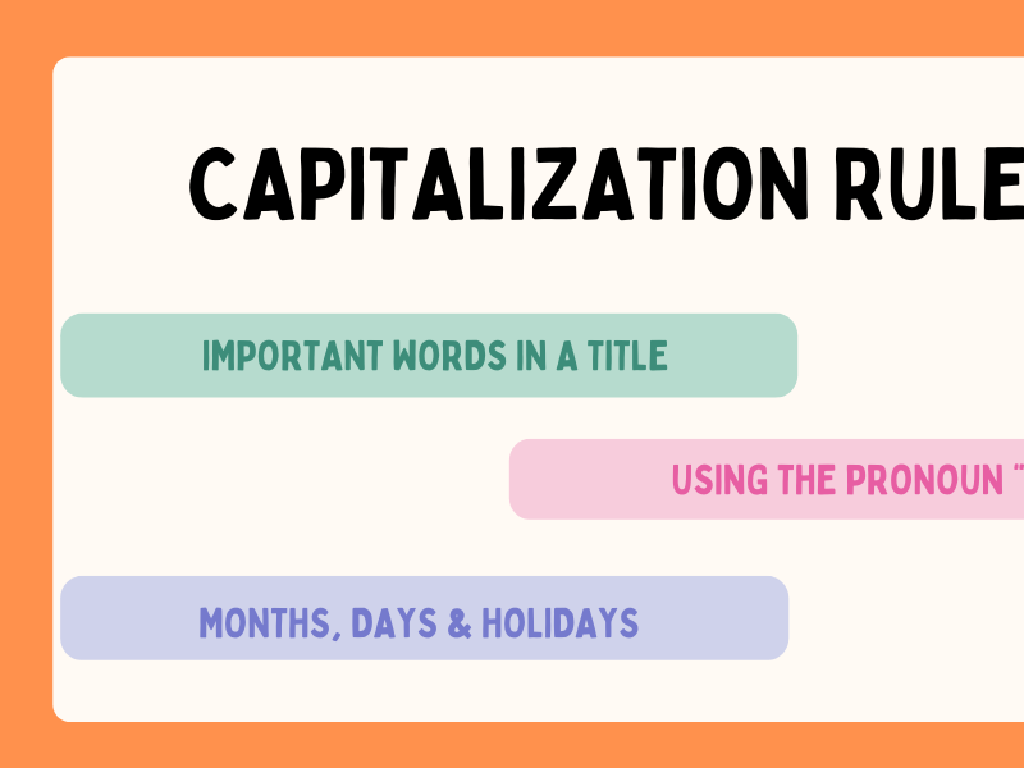Irregular Past Tense: Review
Subject: Language arts
Grade: Eighth grade
Topic: Verb Tense And Mood
Please LOG IN to download the presentation. Access is available to registered users only.
View More Content
Mastering Irregular Past Tense Verbs
– Exploring verb tense and mood
– Defining irregular verbs
– Verbs that don’t follow standard rules, e.g., go – went, not ‘goed’
– Significance of irregular past tense
– Understanding these helps in accurate and fluent communication
– Examples and usage in sentences
– ‘I ate my lunch.’ vs. ‘I eat my lunch yesterday.’ Correct is ‘ate’.
|
This slide introduces the concept of irregular past tense verbs within the broader topic of verb tense and mood. Emphasize that unlike regular verbs, irregular verbs do not follow a predictable pattern when changing from present to past tense. Understanding irregular verbs is crucial for students as it aids in writing and speaking correctly and fluently. Provide examples of irregular verbs and their correct usage in sentences to illustrate the difference between regular and irregular forms. Encourage students to think of more examples and to recognize the importance of using the correct past tense form to convey clear and precise meaning in their communication.
Regular vs. Irregular Verbs
– Regular verbs: add -ed for past tense
– Irregular verbs: no simple rule
– Irregular verbs don’t follow a set pattern, e.g., ‘run’ becomes ‘ran’.
– Examples: ‘walk’ vs. ‘go’
– Regular: ‘walk’ becomes ‘walked’. Irregular: ‘go’ becomes ‘went’.
– Practice: Identify verb types
– List verbs from a text and classify them as regular or irregular.
|
This slide aims to review the concept of regular and irregular verbs. Regular verbs form their past tense by adding -ed to the base form, while irregular verbs change in various ways and do not follow a single pattern. Provide clear examples to illustrate the difference: ‘walk’ is regular, as it becomes ‘walked’, while ‘go’ is irregular, becoming ‘went’. Encourage students to practice by identifying verbs in sentences and determining whether they are regular or irregular. This exercise will help solidify their understanding of past tense verb forms and prepare them for more advanced language arts concepts.
Mastering Irregular Past Tense Verbs
– Explore common irregular verbs
– Verbs that don’t follow standard rules, e.g., go-went, buy-bought
– Practice pronunciation of verbs
– Repeat after me to master the correct pronunciation
– Learn memory tricks for verbs
– Associate words with images or stories to remember
– Engage in interactive activities
|
This slide aims to review irregular past tense verbs, which are verbs that do not follow the typical ‘-ed’ ending pattern in their past tense form. Start by presenting a list of commonly used irregular verbs for students to familiarize themselves with. Follow this with a read and repeat exercise to practice pronunciation, ensuring students are comfortable with how these verbs sound in their irregular forms. Introduce memory tricks, such as mnemonic devices, to help students recall these irregular forms more easily. Engage the class with interactive activities such as a ‘verb charades’ game or a ‘past tense storytelling’ session where students use these verbs in context.
Irregular Past Tense: Forming the Past
– Irregular verbs don’t end in ‘ed’
– Rules for forming irregular past tense
– Some change vowels, some change completely, e.g., go -> went, buy -> bought
– Group Activity: Find the patterns
– Work in groups to identify patterns in irregular verbs
– Why it’s important to know
– Understanding irregular verbs helps in writing and speaking correctly
|
This slide introduces the concept of irregular past tense verbs, which do not follow the standard ‘ed’ ending rule. Highlight the fact that these verbs require memorization and understanding of unique patterns. The group activity is designed to engage students in collaborative learning, where they will work together to identify and categorize patterns among irregular verbs. This exercise will help reinforce their understanding and ability to use these verbs correctly. Emphasize the importance of mastering irregular verbs for effective communication in both written and spoken English. Provide examples of common irregular verbs and their past tense forms for reference.
Irregular Past Tense in Context
– Use irregular past tense in sentences
– ‘I ate my lunch’ instead of ‘I eat my lunch’
– Contextual clues for tense comprehension
– Words like ‘yesterday’ indicate past tense
– Pair work: sentence creation
– Work with a partner to write sentences using irregular past tense verbs
– Share and discuss examples
– Discuss how context helps determine the correct tense
|
This slide aims to reinforce the understanding of irregular past tense verbs through practical application. Students should use verbs that don’t follow the regular ‘-ed’ ending pattern in sentences. Emphasize the importance of contextual clues like time indicators to identify the tense. In pair work, students will collaborate to create their own sentences using irregular past tense verbs, which will then be shared with the class for discussion. This activity will help students to recognize and correctly use irregular past tense verbs in various contexts, enhancing their grasp of verb tenses in English.
Irregular Past Tense: Exceptions and Oddities
– Irregular verbs break the rules
– Memorization of exceptions is key
– Some verbs don t fit patterns and must be memorized, like ‘go’ becoming ‘went’.
– Discuss unique irregular verbs
– Think of verbs like ‘bring’ and ‘brought’, and how they change.
– Share the strangest verbs you’ve found
– Each student will think of and share an irregular verb that they find unusual or interesting.
|
This slide focuses on the irregular verbs that do not follow the typical past tense patterns. Emphasize the importance of memorization when it comes to these exceptions. Encourage students to think about the irregular verbs they have encountered in their reading or daily life that seemed strange or stood out to them. During the class discussion, ask students to share these verbs and explore as a class why these verbs might not follow the regular patterns. This activity will help students remember these exceptions better by associating them with personal experiences or stories. Provide a list of commonly used irregular verbs for reference and encourage students to add to it during the discussion.
Practice Makes Perfect: Irregular Past Tense
– Engage in an interactive quiz
– Test your knowledge on irregular verbs
– Learn from correcting mistakes
– Identify and understand common errors
– Complete the practice worksheet
– Apply what you’ve learned individually
– Review and reinforce learning
|
This slide is designed to encourage active participation and self-assessment in learning irregular past tense verbs. Start with an interactive quiz to engage students and assess their current understanding. Emphasize the importance of learning from mistakes by reviewing incorrect answers and discussing why they are wrong. Provide a worksheet for individual practice, allowing students to apply their knowledge. The worksheet should include a variety of verbs and sentence structures to ensure comprehensive practice. Conclude with a review session to reinforce the learning objectives and clarify any remaining uncertainties. Offer additional resources for further practice if needed.
Class Activity: Verb Tense Relay
– Form teams for relay race
– Write sentences with irregular past tense
– Use verbs like ‘go’ became ‘went’, ‘buy’ became ‘bought’
– Race to finish sentences correctly
– Fastest and most accurate team wins
|
This activity is designed to make learning irregular past tense verbs fun and engaging through a competitive relay race. Divide the class into small teams. Each team will write sentences using a list of irregular past tense verbs provided. The goal is to complete the sentences both accurately and quickly. This will help reinforce their knowledge of irregular verbs in a dynamic way. For the relay aspect, consider having each team member contribute one sentence before passing on the ‘baton’ to the next. The first team to finish with all sentences correct wins. Possible variations include using a timer to add pressure, or having teams correct sentences with common irregular verb mistakes.
Wrapping Up: Irregular Past Tense
– Recap of irregular past tense
– Regular practice is key
– Homework: Craft a short story
– Use 10 different irregular past tense verbs in your story
– Include 10 irregular verbs
– Be creative and ensure the verbs fit naturally in the narrative
|
As we conclude today’s lesson on irregular past tense verbs, remind students of the key points discussed. Emphasize the importance of regular practice to master these verbs, as they often do not follow standard conjugation rules. For homework, students are tasked with writing a short story that incorporates at least 10 different irregular past tense verbs. This exercise will help them apply what they’ve learned in a creative context and reinforce their understanding. Encourage them to think about the narrative flow and how the verbs can be used effectively within their story. In the next class, we can have a few students share their stories to showcase their application of irregular past tense verbs.






